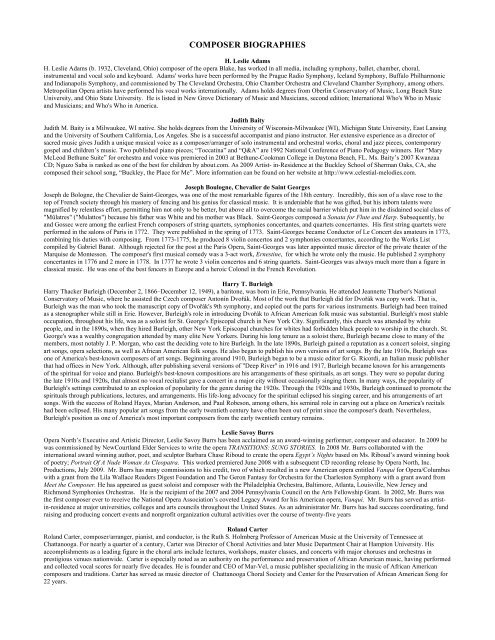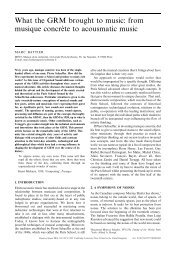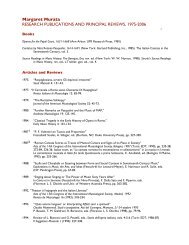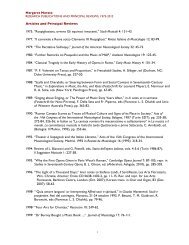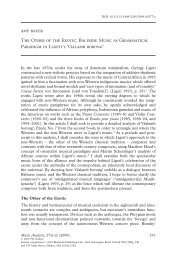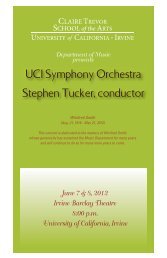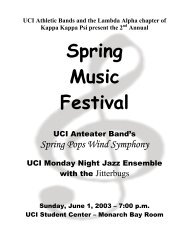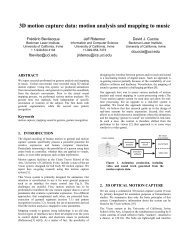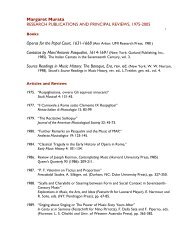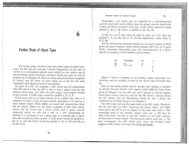âRoots and Branchesâ - Music - University of California, Irvine
âRoots and Branchesâ - Music - University of California, Irvine
âRoots and Branchesâ - Music - University of California, Irvine
Create successful ePaper yourself
Turn your PDF publications into a flip-book with our unique Google optimized e-Paper software.
COMPOSER BIOGRAPHIES<br />
H. Leslie Adams<br />
H. Leslie Adams (b. 1932, Clevel<strong>and</strong>, Ohio) composer <strong>of</strong> the opera Blake, has worked in all media, including symphony, ballet, chamber, choral,<br />
instrumental <strong>and</strong> vocal solo <strong>and</strong> keyboard. Adams' works have been performed by the Prague Radio Symphony, Icel<strong>and</strong> Symphony, Buffalo Philharmonic<br />
<strong>and</strong> Indianapolis Symphony, <strong>and</strong> commissioned by The Clevel<strong>and</strong> Orchestra, Ohio Chamber Orchestra <strong>and</strong> Clevel<strong>and</strong> Chamber Symphony, among others.<br />
Metropolitan Opera artists have performed his vocal works internationally. Adams holds degrees from Oberlin Conservatory <strong>of</strong> <strong>Music</strong>, Long Beach State<br />
<strong>University</strong>, <strong>and</strong> Ohio State <strong>University</strong>. He is listed in New Grove Dictionary <strong>of</strong> <strong>Music</strong> <strong>and</strong> <strong>Music</strong>ians, second edition; International Who's Who in <strong>Music</strong><br />
<strong>and</strong> <strong>Music</strong>ians; <strong>and</strong> Who's Who in America.<br />
Judith Baity<br />
Judith M. Baity is a Milwaukee, WI native. She holds degrees from the <strong>University</strong> <strong>of</strong> Wisconsin-Milwaukee (WI), Michigan State <strong>University</strong>, East Lansing<br />
<strong>and</strong> the <strong>University</strong> <strong>of</strong> Southern <strong>California</strong>, Los Angeles. She is a successful accompanist <strong>and</strong> piano instructor. Her extensive experience as a director <strong>of</strong><br />
sacred music gives Judith a unique musical voice as a composer/arranger <strong>of</strong> solo instrumental <strong>and</strong> orchestral works, choral <strong>and</strong> jazz pieces, contemporary<br />
gospel <strong>and</strong> childrenʼs music. Two published piano pieces; “Toccatina” <strong>and</strong> “Q&A” are 1992 National Conference <strong>of</strong> Piano Pedagogy winners. Her “Mary<br />
McLeod Bethune Suite” for orchestra <strong>and</strong> voice was premiered in 2003 at Bethune-Cookman College in Daytona Beach, FL. Ms. Baityʼs 2007 Kwanzaa<br />
CD; Nguzo Saba is ranked as one <strong>of</strong> the best for children by about.com. As 2009 Artist- in-Residence at the Buckley School <strong>of</strong> Sherman Oaks, CA, she<br />
composed their school song, “Buckley, the Place for Me”. More information can be found on her website at http://www.celestial-melodies.com.<br />
Joseph Boulogne, Chevalier de Saint Georges<br />
Joseph de Bologne, the Chevalier de Saint-Georges, was one <strong>of</strong> the most remarkable figures <strong>of</strong> the 18th century. Incredibly, this son <strong>of</strong> a slave rose to the<br />
top <strong>of</strong> French society through his mastery <strong>of</strong> fencing <strong>and</strong> his genius for classical music. It is undeniable that he was gifted, but his inborn talents were<br />
magnified by relentless effort, permitting him not only to be better, but above all to overcome the racial barrier which put him in the disdained social class <strong>of</strong><br />
"Mûlatres" ("Mulattos") because his father was White <strong>and</strong> his mother was Black. Saint-Georges composed a Sonata for Flute <strong>and</strong> Harp. Subsequently, he<br />
<strong>and</strong> Gossec were among the earliest French composers <strong>of</strong> string quartets, symphonies concertantes, <strong>and</strong> quartets concertantes. His first string quartets were<br />
performed in the salons <strong>of</strong> Paris in 1772. They were published in the spring <strong>of</strong> 1773. Saint-Georges became Conductor <strong>of</strong> Le Concert des amateurs in 1773,<br />
combining his duties with composing. From 1773-1775, he produced 8 violin concertos <strong>and</strong> 2 symphonies concertantes, according to the Works List<br />
compiled by Gabriel Banat. Although rejected for the post at the Paris Opera, Saint-Georges was later appointed music director <strong>of</strong> the private theater <strong>of</strong> the<br />
Marquise de Montesson. The composer's first musical comedy was a 3-act work, Ernestine, for which he wrote only the music. He published 2 symphony<br />
concertantes in 1776 <strong>and</strong> 2 more in 1778. In 1777 he wrote 3 violin concertos <strong>and</strong> 6 string quartets. Saint-Georges was always much more than a figure in<br />
classical music. He was one <strong>of</strong> the best fencers in Europe <strong>and</strong> a heroic Colonel in the French Revolution.<br />
Harry T. Burleigh<br />
Harry Thacker Burleigh (December 2, 1866–December 12, 1949), a baritone, was born in Erie, Pennsylvania. He attended Jeannette Thurber's National<br />
Conservatory <strong>of</strong> <strong>Music</strong>, where he assisted the Czech composer Antonín Dvořák. Most <strong>of</strong> the work that Burleigh did for Dvořák was copy work. That is,<br />
Burleigh was the man who took the manuscript copy <strong>of</strong> Dvořák's 9th symphony, <strong>and</strong> copied out the parts for various instruments. Burleigh had been trained<br />
as a stenographer while still in Erie. However, Burleigh's role in introducing Dvořák to African American folk music was substantial. Burleigh's most stable<br />
occupation, throughout his life, was as a soloist for St. George's Episcopal church in New York City. Significantly, this church was attended by white<br />
people, <strong>and</strong> in the 1890s, when they hired Burleigh, other New York Episcopal churches for whites had forbidden black people to worship in the church. St.<br />
George's was a wealthy congregation attended by many elite New Yorkers. During his long tenure as a soloist there, Burleigh became close to many <strong>of</strong> the<br />
members, most notably J. P. Morgan, who cast the deciding vote to hire Burleigh. In the late 1890s, Burleigh gained a reputation as a concert soloist, singing<br />
art songs, opera selections, as well as African American folk songs. He also began to publish his own versions <strong>of</strong> art songs. By the late 1910s, Burleigh was<br />
one <strong>of</strong> America's best-known composers <strong>of</strong> art songs. Beginning around 1910, Burleigh began to be a music editor for G. Ricordi, an Italian music publisher<br />
that had <strong>of</strong>fices in New York. Although, after publishing several versions <strong>of</strong> "Deep River" in 1916 <strong>and</strong> 1917, Burleigh became known for his arrangements<br />
<strong>of</strong> the spiritual for voice <strong>and</strong> piano. Burleigh's best-known compositions are his arrangements <strong>of</strong> these spirituals, as art songs. They were so popular during<br />
the late 1910s <strong>and</strong> 1920s, that almost no vocal recitalist gave a concert in a major city without occasionally singing them. In many ways, the popularity <strong>of</strong><br />
Burleigh's settings contributed to an explosion <strong>of</strong> popularity for the genre during the 1920s. Through the 1920s <strong>and</strong> 1930s, Burleigh continued to promote the<br />
spirituals through publications, lectures, <strong>and</strong> arrangements. His life-long advocacy for the spiritual eclipsed his singing career, <strong>and</strong> his arrangements <strong>of</strong> art<br />
songs. With the success <strong>of</strong> Rol<strong>and</strong> Hayes, Marian Anderson, <strong>and</strong> Paul Robeson, among others, his seminal role in carving out a place on America's recitals<br />
had been eclipsed. His many popular art songs from the early twentieth century have <strong>of</strong>ten been out <strong>of</strong> print since the composer's death. Nevertheless,<br />
Burleigh's position as one <strong>of</strong> America's most important composers from the early twentieth century remains.<br />
Leslie Savoy Burrs<br />
Opera North’s Executive <strong>and</strong> Artistic Director, Leslie Savoy Burrs has been acclaimed as an award-winning performer, composer <strong>and</strong> educator. In 2009 he<br />
was commissioned by NewCourtl<strong>and</strong> Elder Services to write the opera TRANSITIONS: SUNG STORIES. In 2008 Mr. Burrs collaborated with the<br />
international award winning author, poet, <strong>and</strong> sculptor Barbara Chase Riboud to create the opera Egypt’s Nights based on Ms. Riboud’s award winning book<br />
<strong>of</strong> poetry; Portrait Of A Nude Woman As Cleopatra. This worked premiered June 2008 with a subsequent CD recording release by Opera North, Inc.<br />
Productions, July 2009. Mr. Burrs has many commissions to his credit, two <strong>of</strong> which resulted in a new American opera entitled Vanqui for Opera/Columbus<br />
with a grant from the Lila Wallace Readers Digest Foundation <strong>and</strong> The Geron Fantasy for Orchestra for the Charleston Symphony with a grant award from<br />
Meet the Composer. He has appeared as guest soloist <strong>and</strong> composer with the Philadelphia Orchestra, Baltimore, Atlanta, Louisville, New Jersey <strong>and</strong><br />
Richmond Symphonies Orchestras. He is the recipient <strong>of</strong> the 2007 <strong>and</strong> 2004 Pennsylvania Council on the Arts Fellowship Grant. In 2002, Mr. Burrs was<br />
the first composer ever to receive the National Opera Association’s coveted Legacy Award for his American opera, Vanqui. Mr. Burrs has served as artistin-residence<br />
at major universities, colleges <strong>and</strong> arts councils throughout the United States. As an administrator Mr. Burrs has had success coordinating, fund<br />
raising <strong>and</strong> producing concert events <strong>and</strong> nonpr<strong>of</strong>it organization cultural activities over the course <strong>of</strong> twenty-five years<br />
Rol<strong>and</strong> Carter<br />
Rol<strong>and</strong> Carter, composer/arranger, pianist, <strong>and</strong> conductor, is the Ruth S. Holmberg Pr<strong>of</strong>essor <strong>of</strong> American <strong>Music</strong> at the <strong>University</strong> <strong>of</strong> Tennessee at<br />
Chattanooga. For nearly a quarter <strong>of</strong> a century, Carter was Director <strong>of</strong> Choral Activities <strong>and</strong> later <strong>Music</strong> Department Chair at Hampton <strong>University</strong>. His<br />
accomplishments as a leading figure in the choral arts include lectures, workshops, master classes, <strong>and</strong> concerts with major choruses <strong>and</strong> orchestras in<br />
prestigious venues nationwide. Carter is especially noted as an authority on the performance <strong>and</strong> preservation <strong>of</strong> African American music, having performed<br />
<strong>and</strong> collected vocal scores for nearly five decades. He is founder <strong>and</strong> CEO <strong>of</strong> Mar-Vel, a music publisher specializing in the music <strong>of</strong> African American<br />
composers <strong>and</strong> traditions. Carter has served as music director <strong>of</strong> Chattanooga Choral Society <strong>and</strong> Center for the Preservation <strong>of</strong> African American Song for<br />
22 years.


